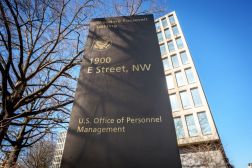Keeping faith with America’s veterans
Putting the 1 percent of Americans who serve the nation in uniform back to work after a decade of war and sacrifice isn’t just a moral imperative, but it also happens to be good for the country’s tech industry.
With more than 18 million science, technology, engineering and mathematics jobs open and few qualified candidates to fill them, America’s tech industry faces a talent crisis like no other time in its history. Likewise, more than 1 million veterans will make the difficult transition from military to civilian life during the next five years. For many, it will be a move from a life of dedication and purpose to one of uncertainty in a frail private economy known more for eating its young than for developing it.
Retired Marine Corps Maj. Gen. Chris Cortez sees an opportunity in the convergence of these two socioeconomic forces.
“Every day industry is pulling their hair out trying to find qualified people to fill those roles,” said Cortez, vice president of the newly created military affairs division at Microsoft. “And now you have this pool of talented service members who are leaving the military and who are going to want to find a job and nobody’s really going after them. But why not? Look at the experience they gain, look at the leadership skills and the tough situations they have to work their way through. This is a pool of talent that can really help America.”
Cortez’s commitment to his fellow veterans isn’t lost on Microsoft. The company has been an active participant in multiple programs designed to put veterans to work. And when Congress passed the VOW to Hire Veterans Act in 2011 — allowing service members to begin the private employment process while still on active duty — Microsoft stepped up and created the Microsoft Software and Systems Academy. The 16-week intensive course provides those who are accepted training in a multitude of IT disciplines and guarantees graduates an interview with the company.
When we get to our full potential, we’ll probably be graduating over a thousand per year.
“They don’t have to have a technology background, but they do have to have some aptitude. And we personally interview them,” Cortez said in an interview at FedScoop headquarters in Washington, D.C. “We select those we truly believe can make it through this. This is not easy. It’s not a give-away program.”
Through Cortez’s leadership, the MSSA program has become the crown jewel of Microsoft’s military affairs division, stood up by Cortez last July. What started 18 months ago as a pilot project at Joint Base Lewis-McChord in Washington state has expanded to Fort Hood, Texas, and Camp Pendleton in California.
To date, about 220 veterans have graduated from the course. “The overwhelming majority of those 220 have been hired into an IT company,” Cortez said. “We don’t and we don’t pretend to be able to hire them all. We guarantee you an interview, but if we don’t hire you, we want you to get a job.”
So far, Microsoft has hired about a third of the graduates — a hire rate that tracks with industry standards in terms of the interview-hire ratio. Microsoft has enlisted its enterprise partner companies in the effort, many of which have agreed to review and interview candidates for open positions.
But even Apple — Microsoft’s historic competitor — has hired a graduate of the MSSA program. “And we’re happy about it. It’s about the veterans,” Cortez said.
Army special forces Sgt. Bernard Bergan remembers his last year in the military as a stressful time for him and his wife. A tour in Afghanistan and the lengthy, unpredictable deployments that come with life in special operations put a great strain on his family — although they would never say it. As he was preparing to finish his six years as an IT specialist with the Army’s 1st Special Forces Group, an unexpected deployment to Korea injected even more uncertainty about how his post-military life would play out.
That’s when he discovered the MSSA program in 2013. At that time, the program was still new and Bergan understood there was some risk involved in dedicating his last 16 weeks to a training program. But because it was Microsoft behind it, he felt the risk was worth taking. And that’s when it started for him.
The program required 12 to 18 hours per day. “It was almost like I was deployed but coming home every night,” Bergan recalled during an interview with FedScoop. “They have 16 weeks to train you and prepare you for a big interview at Microsoft. It’s very intense. It’s not for the faint of heart.”
And while the interview for a job at Microsoft is guaranteed, nothing else is. “That guaranteed interview is like a light at the end of the tunnel, but it starts another tunnel,” Bergan said. “There’s no real preparation for that outside of just digging deep and knowing that as a military [veteran] you’ve been through so many tough things in service to your country that this is just another tough thing you have to go through if this is the goal you want to pursue.”
Veterans like Bergan bring skills that can only be learned through military service. “The military — start to finish — is a leadership program,” he said. “You learn to trust those around you but you also learn that they are completely dependent on what you bring to the table as well. When companies hire veterans they tap into people who are always willing to step up and always willing to lead.”
Cortez called Bergan “a perfect example” of what can be accomplished through the MSSA program, noting that Bergan has already been singled out at Microsoft as a software tester and has been approached by other divisions. “You give these young people a foundational skill set and you allow them to show what they’re capable of in the company and bingo!”
MSSA graduates go on to become system administrators, cloud administrators, database administrators, software developers and software testers, according to Cortez. And plans are to expand the program.
“We’re going to grow it. When we get to our full potential, we’ll probably be graduating over a thousand per year,” Cortez said. “Our goal is that every time we have a graduation that 100 percent get hired by us and other IT companies. Let’s not just get them a job. Let’s get them a good job.”
Cortez is quick to point out that it will take more than just Microsoft to make a significant dent in the converging crises of STEM worker shortages and veteran employment. “There’s no way we can do everything ourselves, but this is the right thing to do and it’s the right time to do it,” he said. “Somebody asked me, ‘What’s your greatest fear?’ There is none. It’s goodness.”






